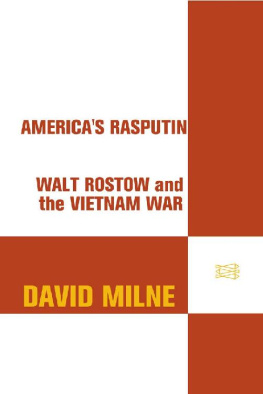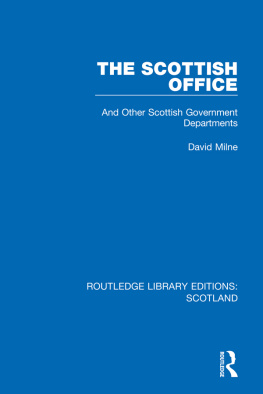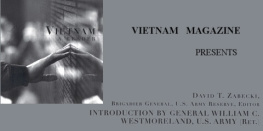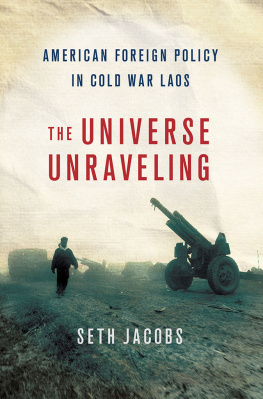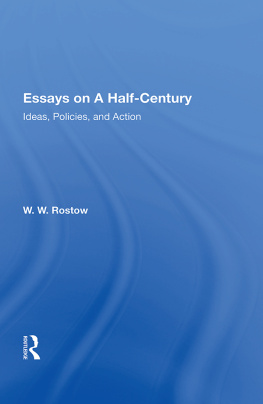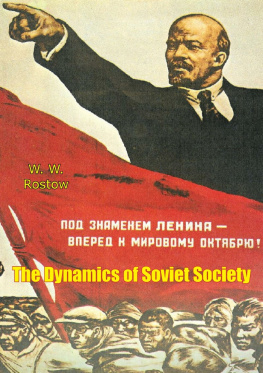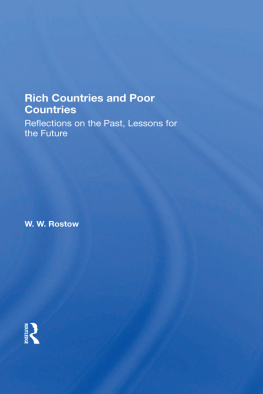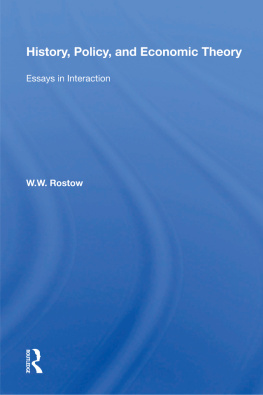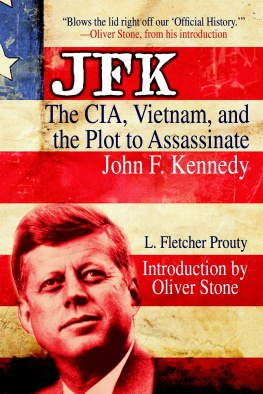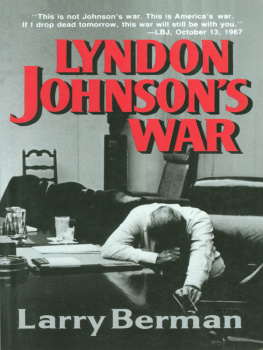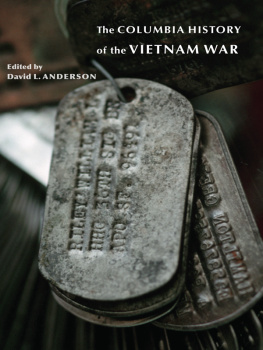AMERICAS
RASPUTIN
AMERICAS
RASPUTIN
WALT ROSTOW and the VIETNAM WAR
David Milne

HILL AND WANG
A division of Farrar, Straus and Giroux
18 West 18th Street, New York 10011
Copyright 2008 by David Milne
All rights reserved
Distributed in Canada by Douglas & McIntyre Ltd.
Printed in the United States of America
First edition, 2008
Library of Congress Cataloging-in-Publication Data
Milne, David, 1976
Americas Rasputin : Walt Rostow and the Vietnam War / David Milne.
1st ed.
p. cm.
Includes bibliographical references.
ISBN-13: 978-0-374-10386-6 (hardcover : alk. paper)
ISBN-10: 0-374-10386-0 (hardcover : alk. paper)
1. Rostow, W. W. (Walt Whitman), 1916 2. Rostow, W. W. (Walt Whitman), 1916Political and social views. 3. Political consultantsUnited StatesBiography. 4. EconomistsUnited StatesBiography. 5. Vietnam War, 1961-1975Diplomatic history. 6. Cold War. 7. Anticommunist movementsUnited StatesHistory20th century. 8. Economic assistance, AmericanDeveloping countriesHistory20th century. 9. United StatesForeign relations19451989. I. Title.
E840.8.R67M55 2008
330.092dc22
[B]
2007019373
Designed by Cassandra J. Pappas
www.fsgbooks.com
1 3 5 7 9 1 0 8 6 4 2
To the memory of Dev Cropper
(19771998)
Contents
Acknowledgments
I have accumulated countless debts through the writing of this book and it is my pleasure to acknowledge them here.
At Cambridge University my doctoral supervisor, Tony Badger, served as my great champion. His encouragement gave me confidence in the project from its infancy and his perceptive comments helped move my argument through to the final stages. John A. Thompson was kind enough to read the manuscript in its entirety and his trenchant criticism has improved the finished product considerably. I am also indebted to my two Ph.D. examinersDavid Reynolds and Odd Arne Westadfor providing such a thoughtful critique of my thesis. My thanks also go to Richard King, Andrew Preston, Joel Isaac, Chester Pach, Fredrik Logevall, Robert Brigham, Matthew Jones, Spencer Mawby, Craig N. Murphy, and Andrew Fearnley, for providing persuasive commentary and suggestions on various chapters. Any errors are, of course, strictly my own.
At Nottingham University I am fortunate to have such bright and engaging colleagues in the Schools of Politics and American Studies. For their friendship, I would particularly like to thank Matthew Jones, Richard King, Neville Wylie, Richard Aldrich, Stephanie Lewthwaite, and Spencer Mawby. In addition to being a fine place to work, Nottingham University granted me a six-month sabbatical in the fall and winter of 2006/2007 to see the project through to completion and funded a trip to the annual Society for Historians of American Foreign Relations conference to present some of my conclusions.
Academic colleagues read the book in various stages, but Id also like to thank my friends and family for offering suggestions from a nonspecialist perspective. My younger sister, Eve Hepburn, was a particularly insightful reader and my older sister, Kerry Spark, helped transcribe my interview with Walt Rostow. I also thank Robert Reed, Nick Hermann, Daniel Crowe, Steve Sudbury, Joel Isaac, Nathaniel Millett, Andrew Preston, Austin Fido, Candace Sobers, Samuel Windham, Dominic Sandbrook, Minsoo Kim, Carlos Lozano, Andrew Trask, Miriam Dobson, and Lucy Griffin for their friendship, encouragement, and some top-notch suggestions. My parents, Margo Milne and Kent Pickles, have given me great support through the years and I thank them for everything.
My literary agent, Andrew Wylie, provided excellent advice on honing my book proposal and matched me with a publisher of the highest qualityI am lucky to have him in my corner. At Hill and Wang, I have been fortunate to work with an editor as skilled as Eric Chinski. He read the manuscript with a wonderful eye for nuance, and encouraged me not just to add color and context, but to engage more directly with Rostows ideas. Thanks to his efforts, the book has been improved immeasurably. His assistant, Gena Hamshaw, has guided me expertly through the process of bringing this book to print, and I am also grateful to Don McConnell and Judy Kiviat for copyediting and proofreading the manuscript and galleys with such care and to Michelle Crehan for steering it through production.
Parts of this book have been published previously in The Journal of Military History, The Scribner Encyclopedia of American Lives, and Vietnam Magazine. I thank the editors of all three publications for allowing me to reproduce some of the material here. Two anonymous readers at the Journal of Military History also helped refine my arguments.
Substantial financial resources were required to research this book. I extend my appreciation to the Arts and Humanities Research Board (for funding my doctoral research), and, at Cambridge University, to the Domestic Research Studentship program, the history facultys Sara Norton Fund, and Sidney Sussex Colleges Parry-Dutton Fund. Additionally, the British Academy funded an essential research trip to the Library of Congress in the summer of 2006. In the United States, I was the fortunate beneficiary of a Fox International Fellowship, based at Yale University, and a Gilder Lehrman Fellowship, based in New York City. My thanks go to the JFK and LBJ libraries for financing six weeks of fieldwork in their archives. In Austin I dealt with an accomplished team of archivists, including John Wilson, Shannon Jarrett, and Regina Greenwell. (Martha Campbell was a wonderful host in the great state of Texas and provided a comfortable home away from home.) In Boston my thanks go to Stephen Plotkin and Sharon Kelly. I was also supported skillfully and efficiently by archivists at the Seeley G. Mudd Manuscript Library, Princeton; Yale University Archives; Columbia Universitys Butler Library; the Library of Congress; and the Massachusetts Institute of Technology.
I could wax lyrical about my wife, Emma Griffin, for many pages. She is a hugely talented historian and a skilled reader, and offered substantive suggestions that have improved the book at every stage. Beyond her talents as a reader, Emma has given me boundless love and encouragement over the years and has made my life a very happy one.
I dedicate this book to the memory of John Devanand Cropper, who made an indelible impression on everyone fortunate enough to know him. Dev was a wonderful friend and an exceptional writer in the making. He died from inexplicable heart failure when he was twenty, and we all miss him terribly.
AMERICAS
RASPUTIN
INTRODUCTION
O N FEBRUARY 27, 1968, President Lyndon Johnsons closest foreign-policy advisers gathered in the White House to discuss a war that had spiraled out of control. A month previously South Vietnams major towns and cities had been overrun by communist insurgents dedicated to unifying their nation under North Vietnams president, Ho Chi Minh. Johnson had been promised light at the end of the tunnel at the end of 1967, and the Tet Offensive (so called because the assault coincided with the eve of Tet, the lunar New Year) devastated his administrations credibility. Most recognized that while the campaign was a conventional military defeat for the insurgents, their psychological victory had been comprehensive. Who could now believe that the United States was winning the war? The mood in the West Wing was accordingly funereal.
The outgoing secretary of defense, Robert S. McNamara, spoke first. He reported that General William Westmoreland, Americas ranking field commander, wanted the president to dispatch 206,000 additional U.S. combat troops to Vietnambringing total troop levels close to 700,000. To satisfy Westmorelands request, McNamara calculated that the president would have to call up 150,000 reserves, extend the draft, and sanction a 
Next page
